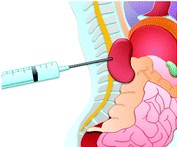 Jiangjiang Liu, R. Graham Cooks and Zheng Ouyang
Jiangjiang Liu, R. Graham Cooks and Zheng Ouyang
Anal. Chem. (2011), 83 (24), 9221-9225
Needle biopsy is a routine medical procedure for examining tissue or biofluids for the presence of disease using standard methods of pathology. In this work, spray ionization directly from tissue in the biopsy needle is shown to provide highly specific molecular information through mass spectrometry analysis. The data are available within a minute after the tissue biopsy, a time scale that allows immediate medical decisions to be made. This method has been performed for tissues in a variety of organs including brain, liver, kidney, adrenal gland, stomach, and spinal cord. Amino acids, hormones, fatty acids, anesthetics, and phospholipids are detected from the tissues and identified using exact mass measurement and tandem mass spectrometry. Lipid profiles are rich in information and, as in imaging MS methods, they have the potential to serve to distinguish diseased from healthy tissue. Needle biopsies allow a crude form of depth profiling that is demonstrated with the analysis of tissue samples taken by a needle inserted into a porcine kidney at various depths.


No responses yet